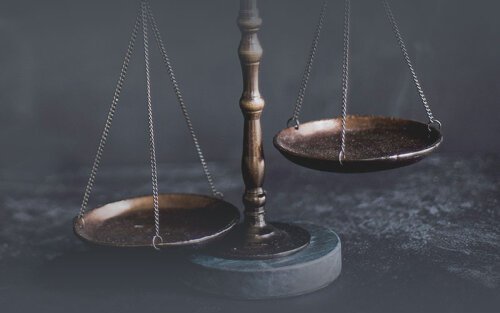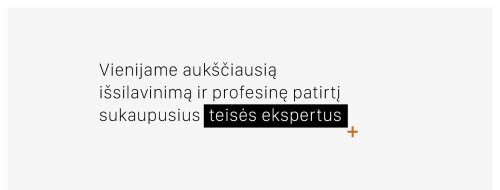Best Debt & Collection Lawyers in Kaunas
Share your needs with us, get contacted by law firms.
Free. Takes 2 min.
List of the best lawyers in Kaunas, Republic of Lithuania
About Debt & Collection Law in Kaunas, Republic of Lithuania
Debt and collection law in Kaunas, Republic of Lithuania, is governed by national legislation, primarily the Civil Code of Lithuania and related acts. The city, being one of the largest commercial hubs in Lithuania, sees frequent transactions involving individuals and businesses, sometimes resulting in unpaid debts. Debt collection involves the process by which creditors can recover money owed by debtors, following established legal procedures. Both amicable and judicial avenues are available for resolving debt disputes. It is essential for both creditors and debtors to understand their rights and responsibilities to ensure fair and legal recovery or repayment of debts.
Why You May Need a Lawyer
A lawyer specializing in debt and collection can be crucial in various situations. These may include:
- Difficulty recovering money owed from individuals or businesses - Receiving a court summons for debt claims - Negotiating repayment schedules or settlements - Understanding your legal rights if you are being pursued by debt collectors - Facing harassment or unlawful collection tactics - Navigating bankruptcy or insolvency proceedings - Drafting or reviewing contracts to avoid future debt disputes - Disputing the validity or amount of the alleged debt - Ensuring compliance with Lithuanian legal procedures to prevent additional liability - Managing cross-border debt collection when a party is located outside Lithuania
A knowledgeable lawyer can guide you through the legal process, advocate on your behalf, and help protect your financial interests.
Local Laws Overview
Debt and collection matters in Kaunas are primarily regulated by the Civil Code of the Republic of Lithuania. Key aspects include:
- Legal claim limitation periods usually range from 3 to 10 years, depending on the nature of the debt - Creditors are encouraged to seek amicable settlement before pursuing court action - If a debtor fails to pay, creditors may apply to court for a payment order or initiate a full civil lawsuit - Debt collection agencies must operate within the bounds of the law and are not permitted to use aggressive, deceptive, or harassing practices - The law provides for enforcement proceedings with bailiffs (antstoliai) if a court order exists - Debtors have the right to challenge claims and seek protection from unlawful collection actions - Bankruptcy and restructuring procedures are regulated under separate laws for both individuals and companies
Violations of debtor or creditor rights can lead to legal liabilities, penalties, or nullification of claims.
Frequently Asked Questions
What is the first step if someone owes me money in Kaunas?
The first step is usually to send a written demand for payment to the debtor, setting out the details of the debt and a deadline for payment. This can often resolve the issue without the need for court involvement.
How long do I have to collect a debt in Lithuania?
The statute of limitations varies by debt type but is commonly 3 years for most contractual obligations. Some debts may have longer limitation periods.
Can I hire a debt collection agency in Kaunas?
Yes, you can instruct a licensed debt collection agency to recover outstanding debts on your behalf, but they must comply with Lithuanian law when conducting collections.
What happens if a debtor ignores a court payment order?
If a debtor fails to comply with a court order, the creditor can request enforcement through a bailiff, who may seize assets or initiate other legal measures to recover the debt.
Am I responsible for someone else's debts if I co-signed a contract?
As a co-signer or guarantor, you may be held liable for the debt if the primary debtor defaults, depending on the terms of the agreement.
Can my wages or property be seized for unpaid debt?
If a court order exists, bailiffs can enforce collection by seizing wages, bank accounts, or property, subject to legal exemptions that protect a minimum living standard.
Are there protections against aggressive debt collection tactics?
Yes. Lithuanian law prohibits harassment, threats, and other aggressive behavior by debt collectors. Offenders may be subject to penalties.
How can I challenge a debt if I believe it is incorrect?
You have the right to contest the debt in writing or in court, presenting evidence and legal arguments to support your position.
What are the options if I cannot pay my debts?
You may negotiate a repayment plan, seek legal protection through insolvency procedures, or consider personal bankruptcy if eligible under Lithuanian law.
Do courts in Kaunas handle international debt collection?
Yes. Courts in Kaunas have jurisdiction to handle cross-border debt cases when local parties are involved, and can cooperate with foreign authorities as regulated by European Union rules and international treaties.
Additional Resources
- Kaunas Regional Court (Kauno apygardos teismas): Handles civil debt cases and provides information on court procedures - Lithuanian Chamber of Bailiffs (Lietuvos antstolių rūmai): For information on enforcement of judgments - State Consumer Rights Protection Authority (Valstybinė vartotojų teisių apsaugos tarnyba): For debtor rights concerning consumer loans - Lithuanian Bar Association (Lietuvos advokatūra): For finding qualified debt and collection lawyers - Official State Legal Aid Service (Valstybės garantuojamos teisinės pagalbos tarnyba): For individuals eligible for state-subsidized legal assistance - Ministry of Justice of the Republic of Lithuania (Lietuvos Respublikos teisingumo ministerija): Source of up-to-date laws and legal acts
Next Steps
If you are facing a debt or collection issue in Kaunas, Republic of Lithuania, consider the following actions:
- Collect and organize all relevant documents, such as contracts, payment records, and correspondence - Attempt amicable settlement where possible, documenting all communications - Consult with a specialized debt and collection lawyer for personalized legal advice - Explore state-supported legal aid if you meet eligibility criteria - If necessary, initiate or respond to legal proceedings with professional assistance - Stay informed about your rights and obligations throughout the process
Taking timely and informed steps will help protect your interests and ensure your case is handled according to Lithuanian law.
Lawzana helps you find the best lawyers and law firms in Kaunas through a curated and pre-screened list of qualified legal professionals. Our platform offers rankings and detailed profiles of attorneys and law firms, allowing you to compare based on practice areas, including Debt & Collection, experience, and client feedback.
Each profile includes a description of the firm's areas of practice, client reviews, team members and partners, year of establishment, spoken languages, office locations, contact information, social media presence, and any published articles or resources. Most firms on our platform speak English and are experienced in both local and international legal matters.
Get a quote from top-rated law firms in Kaunas, Republic of Lithuania — quickly, securely, and without unnecessary hassle.
Disclaimer:
The information provided on this page is for general informational purposes only and does not constitute legal advice. While we strive to ensure the accuracy and relevance of the content, legal information may change over time, and interpretations of the law can vary. You should always consult with a qualified legal professional for advice specific to your situation.
We disclaim all liability for actions taken or not taken based on the content of this page. If you believe any information is incorrect or outdated, please contact us, and we will review and update it where appropriate.
















